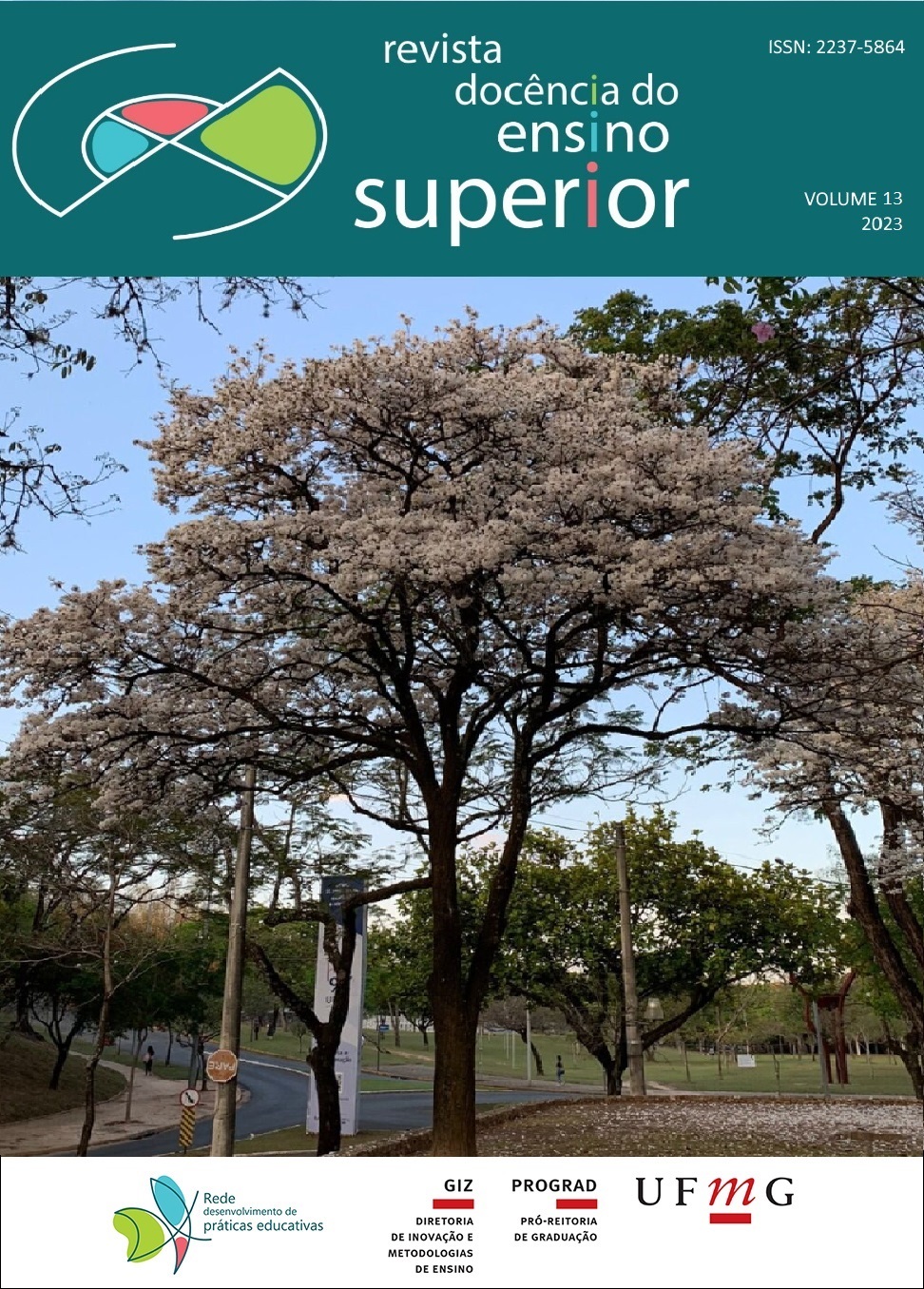Challenges and Contemporary Perspectives of University Teaching
a dialogue with professor António Nóvoa
DOI:
https://doi.org/10.35699/2237-5864.2023.48009Keywords:
university pedagogy, university teaching, teacher training, professional identity, university-school articulationAbstract
Interview conducted with professor António Nóvoa on the contemporary challenges of university teaching. In August 2023, professor Nóvoa was at the Federal University of Minas Gerais (UFMG) to hold a conference and on the occasion granted an interview to the professors who are members of the editorial committee of the Revista Docência no Ensino Superior (RDES), that integrates the Directorate of Innovation and Teaching Methodologies (GIZ) at UFMG. The research technique used was a direct collection through an interview. When preparing the instrument, the author's production in the field of university pedagogy was considered, in addition to issues relating to the training of university professors, professional identity, university-school articulation, technologies and challenges of university teaching in the 21st century. In dialogue with the professor, we had the privilege of exploring his enriching contributions, revealing how his ideas have contributed to redefine and strengthen teacher training in different contexts. By evidencing the present challenges in higher education, Nóvoa indicates ways to promote public, secular, and free higher education, in addition to highlighting the importance of freedom and innovation in the construction of two pedagogical processes with students and also in teacher training.
Downloads
References
NÓVOA, António. Formação de professores e profissão docente. In: NÓVOA, António. Os professores e sua formação. Lisboa: Dom Quixote, 1992. Disponível em: http://repositorio.ul.pt/bitstream/10451/4758/1/FPPD_A_Novoa.pdf. Acesso em: 07 set. 2023.
NÓVOA, António; FORESTI, Miriam Celí Pimentel Porto; PEREIRA, Maria Lúcia Toralles. Universidade e formação docente – Entrevista. Revista: Interface – Comunicação, Saúde, Educação, v. 4, n. 7, ago. 2000. Disponível em: https://www.scielo.br/j/icse/a/GvJyMSqMSQQpjvnWcRrHkTQ/?lang=pt. Acesso em: 07 set. 2023.
NÓVOA, António. Conferência proferida na abertura. In: VII CONGRESSO IBEROAMERICANO DE DOCÊNCIA UNIVERSITÁRIA – ENSINO SUPERIOR. 2012. Anais [...] Portugal, 2012. Disponível em: https://edisciplinas.usp.br/pluginfile.php/5749665/mod_resource/content/1/pedagogia_universitaria_antonio_novoa.pdf. Acesso em 08/09/2023.
NÓVOA, António; AMANTE, Lúcia. Em busca da Liberdade. A pedagogia universitária do nosso tempo. REDU – Revista de Docencia Universitaria, v. 13, n. 1, jan./abr. 2015, p. 21-34. Disponível em: https://polipapers.upv.es/index.php/REDU/article/view/6441/6506. Acesso em: 07 set. 2023.
NÓVOA, António. Professores: libertar o futuro. São Paulo: Diálogos Embalados, 2023.
Universidade Federal de Minas Gerais (UFMG). Notícias: António Nóvoa defende a escola como local de trabalho para os alunos. 2023. Disponível em: https://ufmg.br/comunicacao/noticias/antoniio-novoa-defende-a-escola-como-local-de-trabalho-para-os-alunos. Acesso em: 07 set. 2023.
Downloads
Published
How to Cite
Issue
Section
License
Copyright (c) 2023 António Nóvoa, Pauliane Romano Cirilo, Patrícia Nascimento Silva, Bréscia França Nonato

This work is licensed under a Creative Commons Attribution 4.0 International License.
Authors who publish in this journal retain the copyright and grant the journal the right of first publication, with the work simultaneously licensed under the Creative Commons Attribution License which allows the sharing of work with acknowledgment of authorship and initial publication in this journal.
Authors are authorized to take additional contracts separately, for non-exclusive distribution of the version of the work published in this journal (e.g. publish in institutional repository or as a book chapter), with acknowledgment of authorship and initial publication in this journal.
Open access policy:
Revista Docência do Ensino Superior is an Open Access journal, which means that all content is available free of charge, at no cost to the user or their institution. Users may read, download, copy, distribute, print, search, or link to the full texts of the articles, or use them for any other legal purpose, without seeking prior permission from the publisher or author, provided they respect the license to use the Creative Commons used by the journal. This definition of open access is in line with the Budapest Open Access Initiative (BOAI).
























